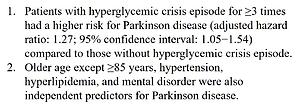Current issue
Archive
Manuscripts accepted
About the Journal
Editorial office
Editorial board
Section Editors
Abstracting and indexing
Subscription
Contact
Ethical standards and procedures
Most read articles
Instructions for authors
Article Processing Charge (APC)
Regulations of paying article processing charge (APC)
DIABETOLOGY / RESEARCH PAPER
Hyperglycemic crisis and Parkinson disease: A retrospective cohort study based on nationwide data
1
Chi Mei Medical Center, Taiwan
Submission date: 2022-06-18
Final revision date: 2022-12-31
Acceptance date: 2023-01-20
Online publication date: 2023-01-27
Corresponding author
KEYWORDS
TOPICS
ABSTRACT
Introduction:
Hyperglycemic crisis episode (HCE) suggests a poor control of diabetes, which may increase the risk of Parkinson disease (PD). This study aimed to clarify this issue since literature remains unclear.
Material and methods:
Patients with diabetes with and without HCE matched at a 1:1 ratio by age, sex, and index date between 2000 and 2002 from the Taiwan National Health Insurance Research Database were identified for analyses. Comparison of PD between patients with diabetes with and without HCE was performed by follow-up until 2012. Independent predictors for PD were also investigated among all patients.
Results:
A total of 10,056 patients with diabetes with HCE and an identical number of patients with diabetes without HCE were included in the study. The mean age and male ratio were 62.0 years and 52.1%, respectively in both cohorts. Patients with HCE were found to have higher prevalence rates of hypertension, renal disease, hyperlipidemia, mental disorder, chronic obstructive pulmonary disease, liver disease, and head injury than those without HCE. Patients with HCE for ≥3 times had a higher risk for PD (adjusted hazard ratio [AHR]: 1.27; 95% confidence interval [CI]: 1.05-1.54) compared to those without HCE; however, patients with HCE for 1 or 2 times were not at high risk. Older age except ≥85 years, hypertension, hyperlipidemia, and mental disorder were also independent predictors for PD.
Conclusions:
HCE for ≥3 times is associated with PD. Close follow-up in older patients with HCE as well as control of hypertension, hyperlipidemia, and mental disorder are warranted.
Hyperglycemic crisis episode (HCE) suggests a poor control of diabetes, which may increase the risk of Parkinson disease (PD). This study aimed to clarify this issue since literature remains unclear.
Material and methods:
Patients with diabetes with and without HCE matched at a 1:1 ratio by age, sex, and index date between 2000 and 2002 from the Taiwan National Health Insurance Research Database were identified for analyses. Comparison of PD between patients with diabetes with and without HCE was performed by follow-up until 2012. Independent predictors for PD were also investigated among all patients.
Results:
A total of 10,056 patients with diabetes with HCE and an identical number of patients with diabetes without HCE were included in the study. The mean age and male ratio were 62.0 years and 52.1%, respectively in both cohorts. Patients with HCE were found to have higher prevalence rates of hypertension, renal disease, hyperlipidemia, mental disorder, chronic obstructive pulmonary disease, liver disease, and head injury than those without HCE. Patients with HCE for ≥3 times had a higher risk for PD (adjusted hazard ratio [AHR]: 1.27; 95% confidence interval [CI]: 1.05-1.54) compared to those without HCE; however, patients with HCE for 1 or 2 times were not at high risk. Older age except ≥85 years, hypertension, hyperlipidemia, and mental disorder were also independent predictors for PD.
Conclusions:
HCE for ≥3 times is associated with PD. Close follow-up in older patients with HCE as well as control of hypertension, hyperlipidemia, and mental disorder are warranted.
Share
RELATED ARTICLE
We process personal data collected when visiting the website. The function of obtaining information about users and their behavior is carried out by voluntarily entered information in forms and saving cookies in end devices. Data, including cookies, are used to provide services, improve the user experience and to analyze the traffic in accordance with the Privacy policy. Data are also collected and processed by Google Analytics tool (more).
You can change cookies settings in your browser. Restricted use of cookies in the browser configuration may affect some functionalities of the website.
You can change cookies settings in your browser. Restricted use of cookies in the browser configuration may affect some functionalities of the website.



